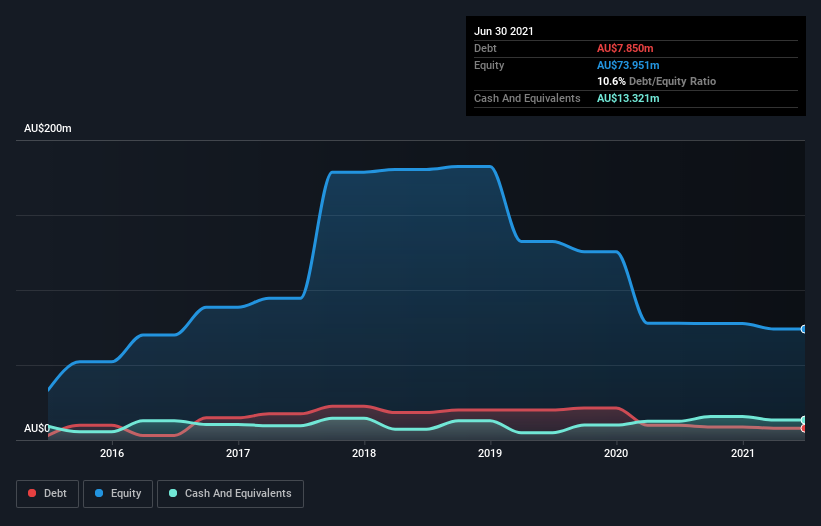Is Experience Co (ASX:EXP) Using Debt Sensibly?
Howard Marks put it nicely when he said that, rather than worrying about share price volatility, 'The possibility of permanent loss is the risk I worry about... and every practical investor I know worries about.' When we think about how risky a company is, we always like to look at its use of debt, since debt overload can lead to ruin. As with many other companies Experience Co Limited (ASX:EXP) makes use of debt. But is this debt a concern to shareholders?
What Risk Does Debt Bring?
Debt is a tool to help businesses grow, but if a business is incapable of paying off its lenders, then it exists at their mercy. If things get really bad, the lenders can take control of the business. However, a more usual (but still expensive) situation is where a company must dilute shareholders at a cheap share price simply to get debt under control. Having said that, the most common situation is where a company manages its debt reasonably well - and to its own advantage. When we think about a company's use of debt, we first look at cash and debt together.
See our latest analysis for Experience Co
What Is Experience Co's Net Debt?
The image below, which you can click on for greater detail, shows that Experience Co had debt of AU$7.85m at the end of June 2021, a reduction from AU$9.76m over a year. However, its balance sheet shows it holds AU$13.3m in cash, so it actually has AU$5.47m net cash.
How Strong Is Experience Co's Balance Sheet?
We can see from the most recent balance sheet that Experience Co had liabilities of AU$19.7m falling due within a year, and liabilities of AU$23.0m due beyond that. Offsetting these obligations, it had cash of AU$13.3m as well as receivables valued at AU$1.84m due within 12 months. So it has liabilities totalling AU$27.5m more than its cash and near-term receivables, combined.
Since publicly traded Experience Co shares are worth a total of AU$241.6m, it seems unlikely that this level of liabilities would be a major threat. Having said that, it's clear that we should continue to monitor its balance sheet, lest it change for the worse. Despite its noteworthy liabilities, Experience Co boasts net cash, so it's fair to say it does not have a heavy debt load! The balance sheet is clearly the area to focus on when you are analysing debt. But it is future earnings, more than anything, that will determine Experience Co's ability to maintain a healthy balance sheet going forward. So if you're focused on the future you can check out this free report showing analyst profit forecasts.
Over 12 months, Experience Co made a loss at the EBIT level, and saw its revenue drop to AU$44m, which is a fall of 49%. That makes us nervous, to say the least.
So How Risky Is Experience Co?
Statistically speaking companies that lose money are riskier than those that make money. And the fact is that over the last twelve months Experience Co lost money at the earnings before interest and tax (EBIT) line. And over the same period it saw negative free cash outflow of AU$3.1m and booked a AU$4.8m accounting loss. Given it only has net cash of AU$5.47m, the company may need to raise more capital if it doesn't reach break-even soon. Overall, we'd say the stock is a bit risky, and we're usually very cautious until we see positive free cash flow. The balance sheet is clearly the area to focus on when you are analysing debt. However, not all investment risk resides within the balance sheet - far from it. For instance, we've identified 1 warning sign for Experience Co that you should be aware of.
If you're interested in investing in businesses that can grow profits without the burden of debt, then check out this free list of growing businesses that have net cash on the balance sheet.
This article by Simply Wall St is general in nature. We provide commentary based on historical data and analyst forecasts only using an unbiased methodology and our articles are not intended to be financial advice. It does not constitute a recommendation to buy or sell any stock, and does not take account of your objectives, or your financial situation. We aim to bring you long-term focused analysis driven by fundamental data. Note that our analysis may not factor in the latest price-sensitive company announcements or qualitative material. Simply Wall St has no position in any stocks mentioned.
Have feedback on this article? Concerned about the content? Get in touch with us directly. Alternatively, email editorial-team (at) simplywallst.com.


